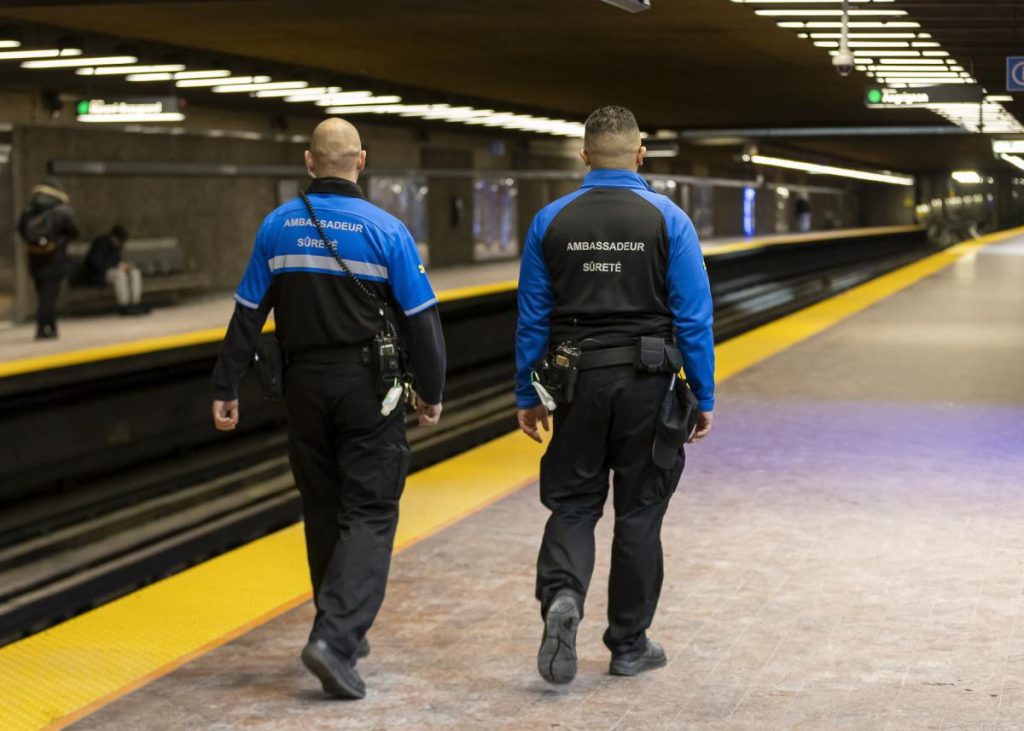STM deploys Safety Ambassadors in Montreal metro

The Société de transport de Montréal (STM) officially deployed safety ambassadors on the metro line to help maintain safety for all customers.
Similar to cities like Los Angeles, San Francisco and Philadelphia, the safety ambassadors are field teams that provide people with guidance and support during public transit trips, according to a press release by the STM.
The safety ambassadors can easily be seen by their blue and black uniforms.
Advertisement

In groups of two, their goal is to work as a reassuring presence to customers by answering their questions and providing them any information they may need.
They’re also trained to identify potentially dangerous situations and report them to security teams.
According to the STM, 47,000 reports were made last year to special constables looking for help compared to 42,000 in 2022.
That’s a 12 per cent increase within 12 months.
“In the face of social issues that are becoming increasingly prevalent on our network, the STM’s strategy is to increase the visibility of staff and strengthen our ability to intervene,” said Éric Alan Caldwell, Chair of the STM Board of Directors. “The creation of a new team of safety ambassadors is a first in the history of the Montréal metro, and these new, dedicated resources will meet a very specific need for our customers.”
Advertisement
Caldwell went on to further explain why these new measures are important.
“We want to ensure that everyone can get the help they need to navigate the network better and feel safer. By adding safety ambassadors to our security teams and other security measures, we believe we can effectively address this need.”
There are currently six ambassadors in and around station turnstiles, on platforms and in the metro cars in Montreal.
They have received 80 hours of training to prepare them for various situations they may encounter such as identifying safety issues, supporting major events and providing customer assistance. However, they aren’t allowed to use any force and must call constables or police officers if needed.
Advertisement
The STM aims to hire 15 more safety ambassadors and $600,000 has been set aside for this program.
New security measures
The STM has added 16 new special constables to the network for a total of 200 since December 2023.
In addition, eight members of the Équipe mobile de médiation sociale (EMMIS) team now respond directly to calls from the metro control room for situations related to social issues.
The STM also promises to be “more responsive” in terms of cleanliness, by hiring 20 maintenance workers who will target busy stations.
Reporting a situation
There are various ways to report situations, according to the STM.
Advertisement
For immediate emergencies like health problems or sudden illness:
- Use the assistance station (red phone) located at the ends of the platforms to contact the control room;
- Use the intercom in the metro car to reach the train operator;
- Alert a metro station agent or a member of the maintenance staff to contact the security teams;
- Alert a special constable or a safety ambassador;
- Call 911.
For non-emergency situations that don’t require immediate intervention like solicitation or loitering, the STM has updated its online customer contact where you can report these types of issues. This form can be found and completed on the STM website.
“Customers are some of the eyes and ears of our security teams,” said Jocelyn Latulippe, Director of Security and Fire Safety at the STM. “We need their input to respond quickly to these situations. These comments and reports allow us to tailor our security measures and improve the way we dispatch our constables and ambassadors on the network.”
Official opposition spokesperson for public safety for Ensemble MTL, Abdehaq Sari, called the Plante administration out of touch with the amount of people feeling unsafe using public transportation.
“The Plante administration has decided to reduce police presence in the STM network by 20 per cent,” he said. “Relying on the safety ambassador programme is not enough, especially as only six ambassadors currently cover the entire network, and they are not equipped to respond to all interventions.”
